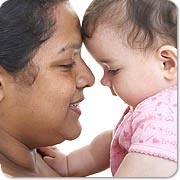Babies: Connecting & Communicating

Connecting with your baby means communicating with your eyes, your voice and some comforting cuddles.
Getting to know each other has moved to an exciting new level. Your baby can now see better and understand more about 'his' people. He has emotions and is not afraid to show them.
Whether you're singing a song or talking about what's for dinner, your communication is helping baby learn and develop. Talking to him a lot teaches him about language. To find out more, go to The more talk, the better.
By nine months, your baby's memory improves and he is getting attached to people and objects. To help him understand how things disappear and reappear, you can give him lots of physical attention and verbal reminders of where you are as you move around a room. A fun game of 'peek-a-boo' can also do the trick.
How to 'talk' to your baby
Babyhood is a time for plenty of face-pulling (you and him), conversations that nobody understands (but everyone loves) and the power of the smile. Babies spend their days looking at people's faces and listening to them talk.
'Hellooo sweeetie baaabeee'
Researchers call the special way we talk to babies 'parentese.' And babies love it. Researchers have found that infants prefer parentese to adult conversation. This high pitched, sing-song speech, with exaggerated facial expressions, may help infants learn the sounds of language. Find out more about speaking parentese.
Making eye contact
Your baby loves watching how your face reacts to something he has done. Researchers say it helps him understand the world and form relationships. When your baby deliberately catches your eye, you can look right look back into his eyes. And keep maintaining that eye contact until he looks away. When he makes noises, you can encourage him. Smiling, nodding and encouraging his abilities ('What did you say?', 'Aren't you talking well!') all help your baby to keep communicating.
Talk, baby, talk
As your baby moves closer to 12 months, he may start to babble. When he begins to make lovely little sounds ('ba ba ba', 'da da da'), you may want to try repeating them back to him. Try not to interrupt until he's finished with his "sentence". Also, repeating what you say to him ( 'Are you hungry?', 'You're hungry, aren't you?', 'Ohhh, I'm hungry') can teach your baby what words mean.
Baby sign language
Baby sign language is a fun and simple way for you to communicate with your baby before he can talk. You can start introducing the simple signs for 'milk', 'more', 'food' and 'water' at six months old. Your baby may start using basic signs as early as nine to 12 months old.